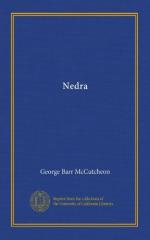“Oh!” she exclaimed, starting sharply. “Lord—Lord Huntingford! Oh, Hugh, I had forgotten—I had not thought—,” but she did not complete the bewildered speech. He could have believed that she did not breathe during the next few moments as she stood there, straight and rigid, clasping his arm convulsively. Then she turned away and walked quickly to the bed on the sand, lying down without a word. He could distinguish nothing of her person save certain outlines in the darkness, and although he listened intently, he heard no sob, no sigh.
Soon his eyes grew heavy and he felt the overpowering force of sleep upon him. Removing his waistcoat, he went to the other side of the cave and prepared to stretch himself out for rest. He paused and listened for a sound from her. None came, so in some trepidation he stepped nearer. Soft, regular breathing, deep and full, told him that she was asleep. In considerable wonder he went back to his hard bed. Out of the confusion of thoughts and impressions that followed her surprising admission, came at last the dim, sleepy understanding of the situation.
She had not thought of Lord Huntingford until he mentioned the old nobleman’s name.
With the last faint whirl of wakefulness came the suggestion of roaming wild beasts, creeping up to attack them in the night, but sleep greedily swallowed the half-formed fear.
CHAPTER XIX
THE FIRST DAY IN THE WILDS
The sun was up hours before Ridgeway stretched his stiff arms, blinked his sleepy eyes and peered wonderingly about his strange apartment. Another and more rapid glance failed to reveal Lady Tennys. His jacket was still there, and a round depression showed that her head had rested upon it all night. The packed sand denoted the once present body of the sleeper.
“Good-morning,” came a sweet, clear voice from somewhere.
“Hello! Where are you?” he called, greatly relieved.
“In the kitchen, of course, getting breakfast for you. The kitchen is down at the spring, you know. Come down.”
He hurried down the path, and found her standing beside the bounding little stream. Her wavy black hair was no longer matted and wild, for, with the water in the cove as a mirror and her big hair comb as the necessary toilet article, she had “done it up” in quite a presentable fashion. Her face was bright and pure in its freshness, her hands were white and immaculately clean; her eyes sparkled with a deeper, clearer blue than ever. She wore an air of resolute confidence in herself.
“I have been up for two hours or more. See how nice and clean I am. Go down there and wash your hands and face and I will comb your hair.” She produced an improvised clothes broom, a stout leafy branch from a cocoanut-tree, and swished the sand from his clothing as he turned about for her obediently.
“These clothes of mine are full of sand and scum from the sea, but before the day is over I intend to give them a good scrubbing and drying. Then I’ll feel like a new man. But wait! This may be Sunday, not Monday. Can’t wash on Sunday, can I? Let’s see, the wreck was on Thursday night, yesterday was Friday and—”




